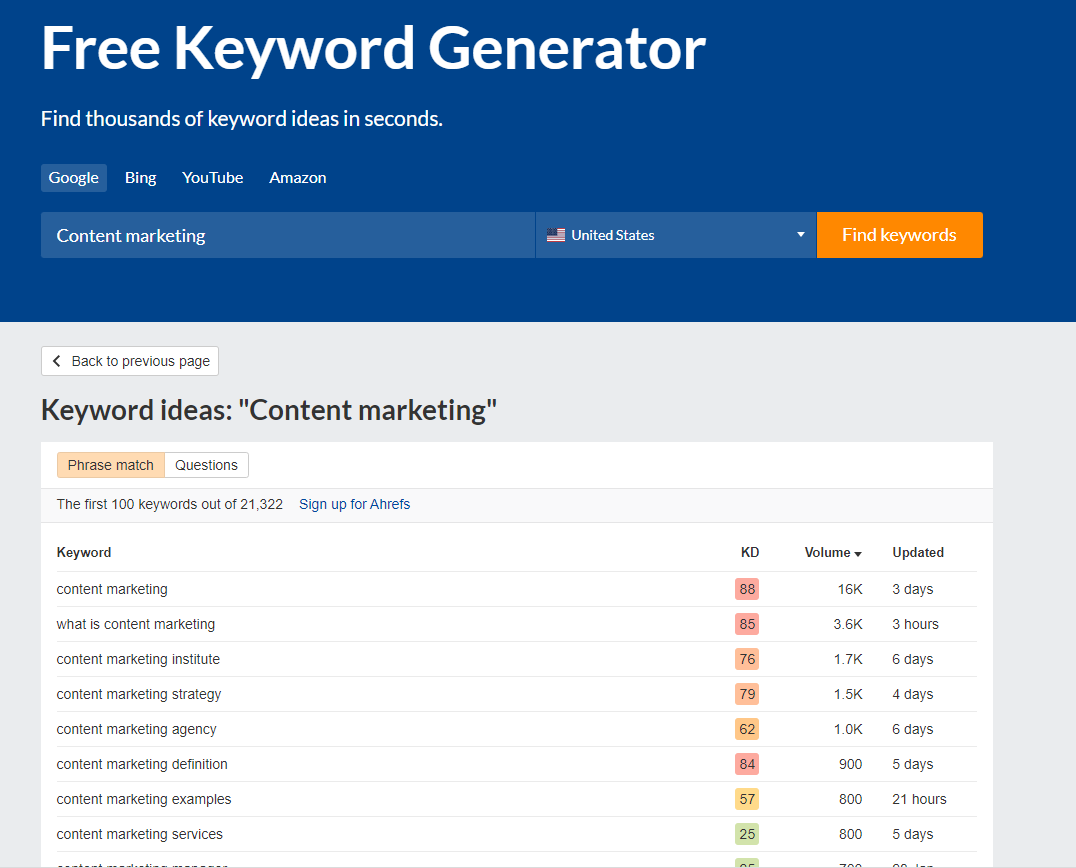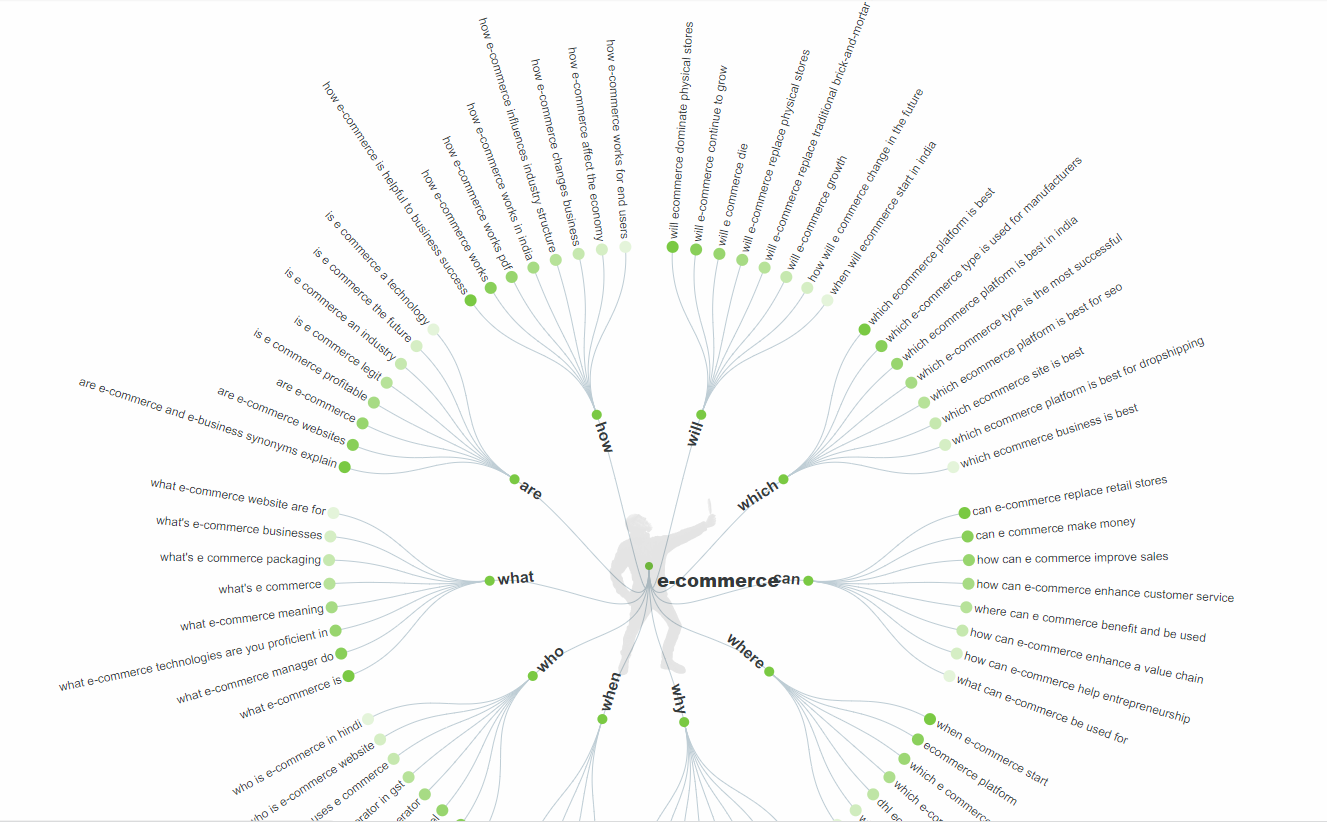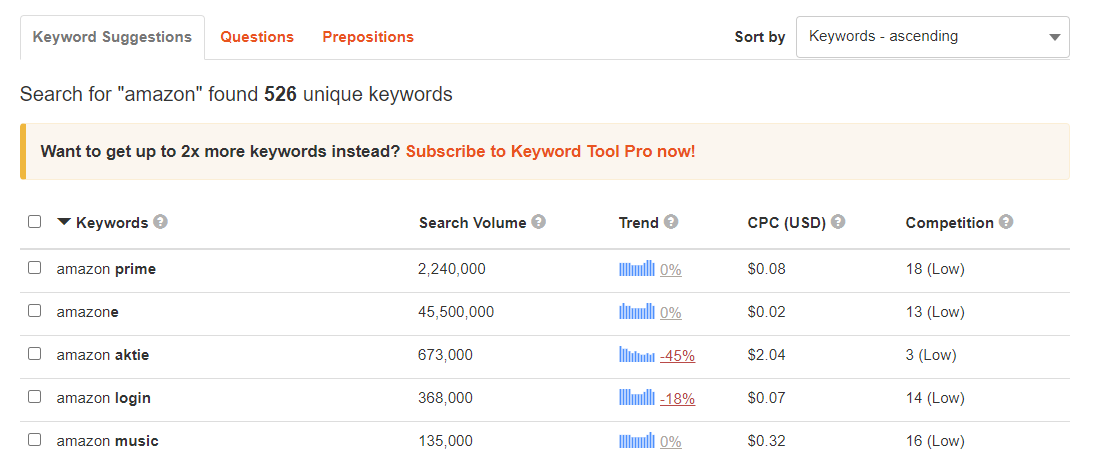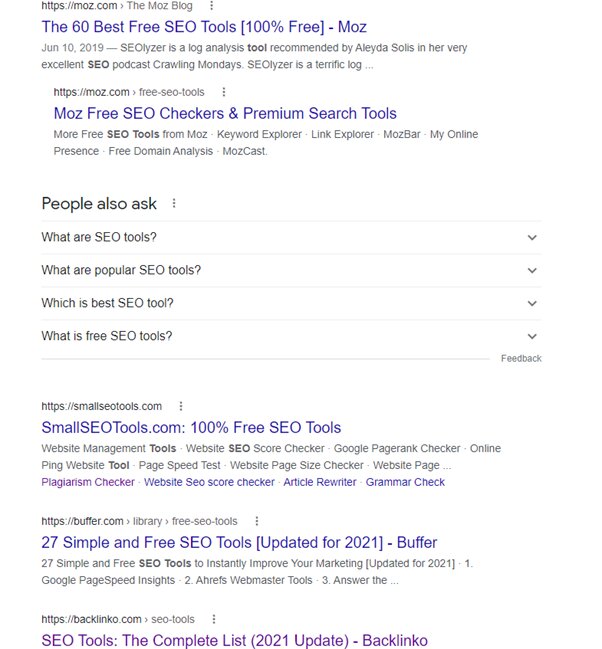Career Tips
Keyword Research: How To Find The Best Keywords For Your Blog

Google occasionally modifies how it ranks websites and shakes up the search engine algorithm. While we’ve seen many algorithm updates, one thing remains constant for brands looking to optimize their pages: keyword research.
What Are Keywords?
Keywords are the words that best describe your page’s unique content. Anything searched on a search engine is a keyword, whether it’s a single word or an entire sentence.
Keywords are clues for Google. As a result, when people look for related search queries, content creators should include keywords that are relevant to what people are typing in search engines so that they have a good chance of ranking.
What Is Keyword Strategy in SEO?
Keyword strategy is the process of targeting specific keywords or phrases to increase your site’s visibility on search engine results pages (SERPs). When you target the right keywords, you not only increase your chances of ranking higher, but you also attract more website visitors and, ultimately, more customers. As a result, it’s critical to ensure that your website is optimized for those keywords and that you incorporate them into your content marketing strategy.
What Is Keyword Research?
The keyword research process allows you to discover phrases that people use to find specific information on Google. SEO keyword research also entails identifying a specific topic and creating content that focuses on targeted keywords.
What Is the Role of Keyword Research?
Keywords matter. They capture the attention of search engine algorithms. Search engines identify pages based on their relevance to specific searches. If your website ranks high, a keyword serves as a free traffic driver for it.
Keywords are strategic factors that play an important role in the growth of a business. You choose your fighting area and then do your best with content to break through. The fact that every site in your field may compete for the top-ranking keywords complicates matters.
SEO keyword research helps brands build accurate content strategies, allowing them to outrank their competitors.
Another issue is that crawlers no longer use keywords to rank websites. The quality of your content is extremely important. But keywords are far from dead. High-ranking sites continue to use search terms relevant to their target demographic. Everyone should know how people are finding their pages; that’s marketing gold dust.
What Are the Types of Keywords?
- Short Tail Keywords
When selecting a primary keyword, it is advisable to target a short-tail keyword that is relevant to your company. To generate the most traffic and leads, all content should be optimized for a mix of long-tail and short-tail keywords.
Head keywords, which consist of a single general word, are highly competitive. On the contrary, the Head keyword has a high traffic potential, but it is difficult to rank.
For example, consider Content Marketing, Content Strategy, Translation Tools, and Copywriting.
- Mid-Tail Keywords
Mid-tail keyword terms are two to three words long and more specific than short-tail keywords. They are moderately competitive key search terms because they provide in-depth coverage of a specific problem or location. For example, the phrase “Art gallery in Manchester” is a mid-tail keyword term that is more specific than the short-tail keyword term ‘art gallery centers’.
- Long-Tail Keywords
Long Tail Keywords are made up of three or more words, or even an entire phrase. Long-tail keywords are specific, niche phrases that people are more likely to look for. This specificity makes it easier to rank these phrases, but the traffic potential is lower because fewer people are looking for them. However, if you target the right long-tail keywords and optimize your content for them, you can achieve fantastic results.
Long-tail keywords are often more useful when writing blog posts and other types of content. This is because they are more specific and can thus be used to entice readers who are already interested in the subject matter.
How to Search for Keywords?
- Brainstorm Seed Keywords
Seed keywords are the foundation of your entire keyword research process. They help you define your niche and identify your competitors.
Brainstorming for keywords is the process of coming up with potential keywords to target for your brand-niche website.
Begin by considering relevant search terms and phrases for your topic or industry. You can then use keyword research tools to generate more ideas before deciding on a single keyword to target.
Simply put yourself in the shoes of your customer and consider what they would search for to find your website. Assuming you are a sneaker manufacturer, your list of seed keywords could look like this:
- Shoes
- Sneakers
- Trainers
Once you have a list of seed keywords, you can generate more specific keyword ideas and expand your research.
- Explore Your Niche and Expertise Field
By exploring your niche and expertise field, you can better understand the questions, problems, and topics people are interested in. Also, this will help you create content that is more relevant and helpful to your audience. Besides, it can also help you identify new opportunities for business growth.
- Use Keyword Research Tools
You can use these tools to find keywords related to your business that people might be searching for online. Furthermore, using keyword research tools allows you to find keywords that your competitors are not targeting, giving you an advantage over them.
It’s also critical to research your competitors’ keywords. This will assist you in identifying the keywords that drive traffic to their site via organic and paid searches, as well as providing information on what interests their audience. The data derived from competitor analysis will help you identify the best keywords for your business and gain a competitive advantage.
What Keyword Research Tools to Use?
Google Keyword Planner (Free)

You can use the keyword planner to find unique keywords related to your business and get estimates of the number of searches they receive. Keyword Planner is a free tool. However, to use this component, you must have a Google Ads account.
Once you create the Google Ad account, you will notice the valuable elements that it has.
- Discover new keywords
- See monthly search stats
- Organize keywords

Ahrefs’ keyword generator is an effective tool for generating keyword ideas and determining their competitiveness. You can enter any desired keyword or phrase, and it will return the top 100 keyword suggestions from its database of over 8 billion keywords.
For each keyword, the generator displays:
- Search volume
- Keyword difficulty
- Related questions to search queries
- The last time of keyword update in Ahref’s index
The keyword generator uses Google and offers free tools for Bing, YouTube, and Amazon. The keyword difficulty tool can help you find the most competitive keywords to target. Ahrefs also provides a free SEO tool that allows you to conduct unlimited searches without creating an account.
Keyword Explorer Ahrefs
Keyword Explorer helps you track competitors’ keywords and overtake them. This tool has many features to boost your website’s SEO. Relevant keyword suggestions, clicks and clicks per search metrics, and outranking competitors are included. Site Explorer, Ahrefs’ competitive research tool, shows the website’s keyword ranking.
It has the world’s largest live backlink index and is updated daily. The user interface is simple and provides all the information you need to make SEO content strategy decisions.
SEMrush Keyword Magic Tool (Free)
You can gain access to these tools by creating an account and selecting Skip Trial. The Keyword Magic Tool sorts keywords into topic-specific subgroups, uses filters to narrow or expand your search, and quickly exports your results from 20 billion keywords. However, the free account only allows you to perform ten searches per day across all of Semrush’s complementary tools.
Free reports contain:
- Search volume
- Competitive density
- Keyword difficulty
SEMrush
When creating optimized content, there are two options for keyword research. You can either hack away with Google’s tools, patiently building up databases of relevant keywords for each individual page, or use tools like SEMRush.
SEMRush provides a “all-in-one marketing toolkit,” which is great, but the tools we use the most involve keyword research. These “competitive intelligence” tools allow you to paste in competitor websites and extract the keywords they rank for — a great shortcut for planning your keyword strategy.

SEMRush offers a variety of marketing tools, but AnswerthePublic is more focused. The name implies that it links keywords to real-world searches.
This tool’s creators created a unique, valuable fusion by scraping Google’s auto-suggest and question databases. Simply enter “baseball caps” into the search field and AnswerthePublic will return a wagon wheel of possibilities in question format.
Answering questions is crucial to ranking high on Google snippets, and this tool makes it easy to identify relevant search queries.

We revisit KeywordTool.io third. Again, this scrapes Google’s autocomplete function, is free, and yields a wealth of long-tail keywords for the content strategy.
AnswerthePublic and KeywordTool use different databases and produce different visualizations, so combining them is best. The keyword tool helps write blogs and articles about trending search terms, while AnswerthePublic answers customer queries.
Better yet, KeywordTool extracts Amazon, YouTube, Instagram, and Twitter keywords. It’s not just a Google tool and can help with social media marketing.
What Is the First Step in Keyword Research?
Current Keyword Analysis
If you are starting from scratch, you can skip this step.
The first step is to understand the current weather in your keyword universe. Analyze to evaluate their performance and set future goals. Use an SEO tool, even if it’s free, to identify underperforming and successful keywords. Poor keywords may have a large search volume but low ranking and CTR.
Develop Goals
Defining your goals is essential to give you a sense of direction within your research.
The question is how to formulate goals for the keyword research process.
- Who is your target audience?
- What are the needs of your personas?
- What are their secondary needs?
- Why are your customers interested in your product?
- What is the point that makes sure your users buy from you?
Create a Potential Keyword Wish List
Now you can go into brainstorming mode. Turn on your industry experience and answer the following questions:
- What and how would they search when receiving information about product-related problems?
- What and how would they search when trying to make an informed decision?
- What and how would they search when buying from you?
Again, you have to activate your senses with quick thinking. Do not accept that your wish list would turn out to be valuable.
How to Analyze Keyword Research Elements?
It is very important to remember that not all keywords are the same when you are doing keyword research. For your brand, some may work better than others. The most important part of keyword research is picking the right ones for your business. These are the ones that will help you reach your business and marketing goals.
There are a variety of factors you will need to consider when making this decision:
- Competitiveness of the keyword
- How much traffic it receives
- What type of searcher is likely to use it
Relevance
Google considers a number of factors to determine how relevant your content is. It includes factors such as the topic of your content, how well it matches the user’s intent, the quality of your writing, and the amount of value it provides. To ensure that your content is as relevant as possible, prioritize staying on topic and providing value to the reader.
Relevancy is one of the most important factors used by search engines like Google to determine which pages will rank for a specific user query. Many factors can influence page relevance, including:
- The topic of the page
- Content value
- The publishing date
Do you answer the needs of searchers? Your content will have the chance to rank if it’s relevant.
Search Volume
Search volume indicates how many people are exploring search queries monthly.
Imagine that you rank successfully for a specific keyword, but it does not derive attention from searches. Does it matter? not. It sounds like opening a restaurant in an abandoned town.
Traffic Potential
Traffic potential represents the amount of search traffic your website could receive if it was ranked on Google. There is a situation in which the query contains searches but no page visits. This means that relying solely on search volume numbers is not a good idea.
That being said, you should consider traffic potential when calculating search volume.
How Can I See What Keywords People Use to Find My Site?
How to Target Keywords?
Despite all the turbulent changes that search engine optimization has gone through, keywords still stay strong. Content creators should follow these steps to succeed in keyword research.
Analyze Current Keywords
Without this step, you can begin from scratch. The first step is to find out what the weather is like in your keyword universe right now. Analyze to judge how well they did and set goals for the future.
Use an SEO tool, even a free one, to find keywords that are working and keywords that aren’t. It’s possible for bad keywords to have a lot of searches but a low ranking and click-through rate (CTR).
Analyze Competitors
Checking the competitors is one of the most popular methods for generating valuable keyword ideas. However, to delve deeper, you will need to pay for the necessary tools. In addition, we will teach you some free methods for discovering keyword opportunities.
Check out who ranks first on Google for the products and services you sell. Don’t forget to include alternative names and phrases that people use when searching for your products and services. But first, ignore the paid advertisements. They did not achieve the highest ranking through organic traffic.
To do so, enter the search term into Google, followed by the site domainname.com (using the competitor brands’ domains). This search returns the alternative keywords that the competitor ranks in Google for this product.
For a more in-depth approach, keyword tools are required. We recommend using paid versions to get a better understanding of the big picture. They allow you to enter a competitor’s domain and discover their top-ranking keywords.
The best way to begin using keywords is to identify high-volume keywords from your competitors. By incorporating these into your content, you can gain a competitive advantage in the SERP.
Use Low-Volume Keywords from Your List for Competitive Advantages
As search volume increases for a keyword, it becomes harder to rank well. To combat this problem, you should find and use keywords with lower search volume. These keywords are often less competitive so you can use them to your advantage for better rankings and more clicks.
Prioritize the Keywords
Do you want to get the most out of your content? Then it is vital to consider which keywords are more important in the market. You can achieve this by analyzing search volume and competition.
Find competitor keywords
You should find all the competitor keywords for your niche with a higher search volume to use them for competition. Use these keywords to outrank the competitors and gain more clicks from users.
Understand Types of Search Intent
Informational Search Query – people search for educational purposes. They want to receive information about specific problems but are not ready to purchase something. These search queries are looking for general facts, directions, explanations, etc.
For example:
What is Search Engine Optimization?
Where is Adidas Store?
How long does it take AI to generate an outline?
Comparison Search Query- comparing and evaluating two or more things by characteristics, differences, and similarities.
For instance:
- Traditional Marketing vs. Digital Marketing.
- E-book vs. White Paper
- E-commerce vs. Traditional Commerce
Transactional Search Query- It has a strong desire to make purchases.
For example:
- Buy used Mac
- The best tools for keyword research under 15$
- Buy Adidas shoes in size 11
Navigational Search Query- A Navigation Search query occurs when someone searches for the name of the company.
Analyze Search Intent
Some people believe that you have to satisfy google to pop up to the top. But, you are analyzing the people’s motives, and google knows the best what they want.
Go to google, type any keyword you want, and look at these components:
Content-Type
- Blog Articles
- Landing Pages
- Infographic
- White Paper
- Content Format
Refers to blog articles and landing pages
- How-to’s
- Tutorials
- List Posts
- Content Angle
What are the benefits of your content?
- Save Time
- Save Money
- Easy Read
Let’s type SEO tools and analyze the results.

We can see that the ranking pages
- Content-type – blogs
- Content Format – lists
- Content Angle – updated for 2021
Now you understand what you have to do if you want to create content for SEO tools. Create list-type blogs that’s how you will satisfy the search intent.
Develop Keyword Hierarchy
1. Primary Keyword
2. Secondary Keywords
3. Additional Keywords
The primary keyword should be the central theme of the entire article. So, the title and content should reflect and approach this.
Secondary keywords are similar to primary keywords, but with minor variations. Additional keywords are phrased or spelled differently than the hierarchy’s two leaders. Here, you try to seize every opportunity to rank and penetrate the diverse minds of customers.
How to Make Sure You Beat the Competition?
Assume we are a search engine optimization consulting company. The first step is to create a list of niche-related seed keywords. In our case, it would be search engine optimization, search engine optimization services, ranking, indexing, keyword research, etc.
We need to determine which phrases are worth keeping and targeting.
How to Choose Keywords Worth Targeting?
Generating keyword ideas
Checking SERP for broad terms like “search engine optimization tools” would take time. So, adding modifiers to it is the best option. If our primary keyword is search engine optimization tools, we can modify it by including the top, current year, and review.
Does your keyword have a search volume?
As search volume determines the popularity of the query, check how many people are looking for a particular keyword.
Examine the traffic potential of the topic
There are situations when the search volume of keywords is high, but traffic potential is minimal. For example, converting Mile to KM has a high search volume, yet traffic potential could not get near it.
Evaluate Ranking Difficulty
You must be ready to compete with other brands for specific keywords. Competitors in search engine optimization are pages that rank first on Google for specific keywords.
Do some of the highest-ranking pages fail to meet search intent? Check the content type, format, and angle.
What Are the Keyword Ranking Difficulty Factors?
- Number of Backlinks
Backlinks are one of the most significant ranking factors. If the page stands out with the number of keywords, it will be tough to compete. All you have to do is ask yourself whether you can generate more backlinks or not.
- URL Rating Domain Authority
URL Rating (UR) gives you the backlink profile strength of a particular URL. This metric has the highest correlation with rankings. If the score is 75+, then you will face a tough challenge.
- Business Value
Some keywords are more valuable for your brand than others. That depends on how closely keywords are related to your company’s product or services.
The recommendation is to try and rank for branded educational and sale-focused keywords.
For example:
- Branded keyword: Learnersroom Services
- Educational keyword: Best content writing services
- Sale-focused keyword: Get content writing services
Where to Use Keywords?
Of course, you should distribute keywords through the text but look for other places to add keywords too. Remember, readability comes first. Include keywords if they fit naturally into the content.
Meta Description
- Meta description helps Google to determine the relevance of the page. So putting keywords there is a good idea. Also, meta description helps searchers decide whether see the full content or not.

Meta Title
- Titles tag is an HTML element that defines the title of a web page. The title tag appears as the clickable headline in search results and social sharing. It is the first-factor search engine crawler, and customers will check.

- Within the First Paragraph
The first sentences of the blog should straightly address the problem and include keywords. So readers and crawlers would know what you are discussing.
- Headings – H1,H2,H3
It will make your content scannable, and people will scan through your website quickly. They may also appear in featured snippets or answer boxes.URL
Create a URL with the below high-frequency keywords. Avoid using special characters, and make the URL readable. SEO-Optimize d URL is short and fresh, providing a pleasant user experience. This “small” detail can help the page push up on search engine results.












